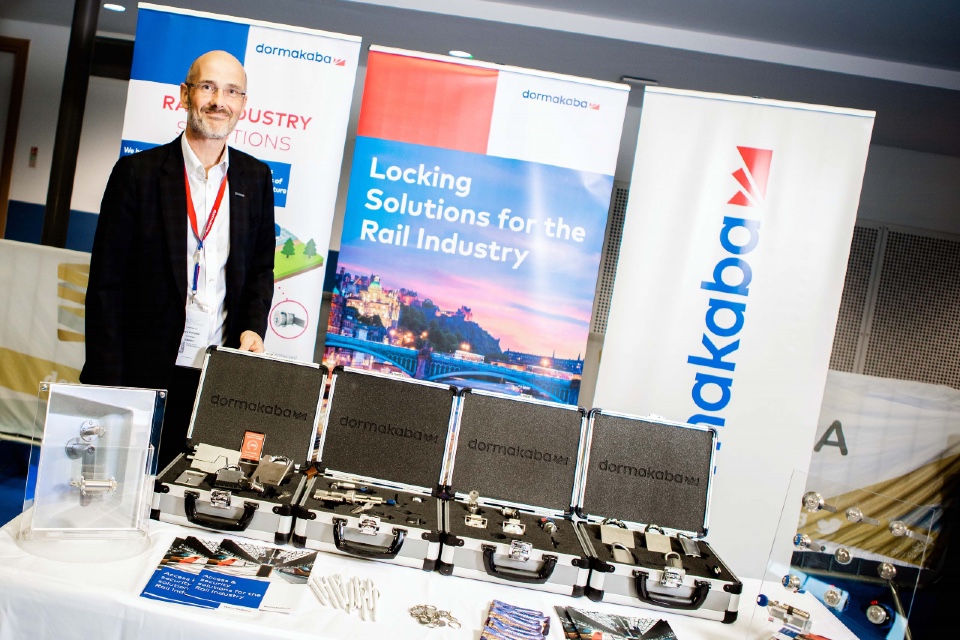In the latest instalment of our security industry executive interview series we spoke to Dormakaba‘s Account Manager for Industrial Locking Systems, David Frampton, about the company, the ongoing impacts of Brexit and COVID-19, the rise of data centre security and the opportunities presented by artificial intelligence…
Tell us about your company, products and services.
In 2016 Dorma and Kaba become dormakaba and immediately became one of the top three companies worldwide providing access control and security solutions.
When I joined Kaba in 2008 our portfolio included locking systems, access control and workforce management systems, hotel locks, safe locks as well as access barriers, gates, and turnstiles. The Dorma range of world-renowned door operators, door closers and door hardware, along with a nationwide service & installation team complimented this. The merger brings together everything you need for secure access to buildings and rooms from one source.
What have been the biggest challenges the Security industry has faced over the past 12 months?
The past 12 months have been unprecedented, a perfect storm you might say, due mainly to the Covid pandemic, but Brexit has also played its part. The industry has, like many, had to deal with managing employee/visitor safety and work patterns, dealing with the physical security threats (break-ins, vandalism, theft) to empty buildings vacated due to lockdown, and the remote securing & management of buildings.
What we are seeing now on a worldwide scale is undoubtably the knock-on effect of the global pandemic, which is essentially supply chain issues. As commonly reported in the press this includes the increased cost and availability of shipping containers, increases in energy and material demand as nations return to normality after the pandemic, and ultimately at a local level this puts a strain on everything from logistics to component supply.
And what have been the biggest opportunities?
As a business there have been many opportunities, one of the more obvious ones bought about by the pandemic was an automated method of controlling people flow into restricted areas. We among other players in the industry developed a traffic light system now utilised on many retail premises.
Also, with the move towards electronic cashless payments, again bought about by the pandemic, we witnessed a significant increase in demand for our products providing physical security on servers and centres handling this data, as well as a general upturn in physical security products for protection of assets that may be targeted by cyber criminals.
What is the biggest priority for the Security industry in 2022?
In a broad sense I believe like many industries that the security industry will need to address the challenge of recruitment and training the right people. At the same time making the security industry more attractive for those considering a long-term career in the sector.
On a more focused perspective in our field of access control, both electronic and mechanical, a better understanding of the human interface of data-driven technology is needed to allow the technology being offered to be fully utilised. Data-driven security helps facilities uncover hidden patterns of data and respond with countermeasures. This potential is unlocked by smart algorithms that sift through masses of data collected by the security tool they’re integrated with, typically using robotics, AI, or IoT technologies and go on to execute data-driven decisions for maximum security.
The rapid and profound changes imposed on all societies by the COVID-19 pandemic in 2020 and again in 2021 once again proved the importance of flexible, agile, and scalable business models and expenditures. Therefore, in the world of access control from 2021 and onwards, we expect to see a surge in subscription-based services and outsourcing. Whether these services in question are technical support, maintenance routines, or cloud-based packages, flexibility will remain a crucial business strategy for executives who want to stay competitive without compromising security.
What are the main trends you are expecting to see in the market in 2022?
As a global business we see several growth drivers shaping our industry. These include demographic change, urbanisation, increasing prosperity in emerging markets and sustainability.
A greater integration of security systems into other management systems whether these be building management systems, or operational systems, allowing a level of artificial intelligence to be utilised. Our focus on connected & integrated products include data driven feedback, predictive product maintenance and embedment of our solutions in digital eco-systems.
Other trends I believe will be Multi-factor authentication (MFA) the process that accelerates safety by ensuring digital users are who they say they are, requiring at least two pieces of credentials to prove their identity. Also, mainly driven by the demand for touch-free entrances, the growth of facial recognition as an access control method is expected to gather significant momentum. There has been a palpable shift from on-premise access systems to cloud-based access systems in the world of access control.
What distinguishes cloud-based access systems from their on-premises counterparts is that they’re hosted on the vendor’s servers and accessed through a web browser. They typically function through the employment of an app that can authorize entry for specific persons in customized spaces and times.
Following the COVID-19 pandemic, keeping track of the number of people and monitoring the crowd flow is more critical than ever. Hence, from 2022 and onward, cloud-based access control will be a prominent physical security trend.
What technology is going to have the biggest impact on the market this coming year?
I believe there will be an increasing trend to utilising smart phones as a means of access and interrogation in a security environment. We have already seen this happening in private homes but now I think it will evolve into more commercial applications.
Smartphones add an extra layer of security for users, combining something they have (their smartphone) with something they know (a PIN or a passcode) or something they are (fingerprints or other biometric data). Because of this, mobile access credentials are secured behind the multi-factor authentication capability of smartphones.
Mobile badging might replace physical badges or keys in many homes and facilities worldwide, making the entrance process more hassle-free and secure. About a fifth of organizations already use smartphones instead of traditional access cards, and this percentage will keep rising further.
In the long run, mobile access can arguably contribute to public health by minimizing touch and enhancing hygiene. People are also more vigilant about their smartphones, taking ownership of their device and keeping it safe. They won’t easily give their smartphone to others. On the other hand, a badge is often lent without reservations. This may result in unauthorized persons gaining access to private areas within a company
In 2023 we’ll all be talking about…?
Sadly, with world events and areas of destabilisation the threat of more sophisticated terrorist attacks is likely, and these will need to be addressed in a collaborative way on many levels. Security threats facing organisations have changed dramatically over the past few years with traditional breaches due to a lost or stolen key, access cards being compromised, or even physical intrusion being overtaken by cyber-attacks on data.
Businesses all over the world are undergoing various forms of digital transformation as they look for ways to better interconnect with their end customers, whether consumer or corporate. However, while digital transformation clearly has its advantages in helping organisations to perform more efficiently and stay ahead of their competitors, it results in the creation of a considerable amount of data which, to be of any value, must be trusted and reliable, and most importantly, be secure.
What’s the most surprising thing you’ve learnt about the Security sector?
The ability of the industry to adapt and develop new solutions in line with the dynamic nature of threats against people, buildings, property and infrastructure.
What’s the most exciting thing about your job?
From a personal point of view the enormous variety of projects I get involved with, from highly sensitive CPNI sites to retail applications. This involves a wide variety of clients and personal and the many different challenges involved in implementing the optimum security solution. The most satisfying aspect is always the successful delivery of a project however large or small.
And what’s the most challenging?
In my line of work it’s how to reach agreement between several parties with different interests, in finding the most effective solution considering, budget, convenience, existing operational protocol and of course effective security.
What’s the best piece of advice you’ve ever been given?
I’ve had two pieces of advice that have stuck with me throughout the years. The first is on a general level that “The devil is in the detail” and the second was “Try to put yourself in the mind of the criminal or terrorist, thinking as broadly as you can, when specifying a product or helping in the development of a resilience plan, strategy, or policy”.






